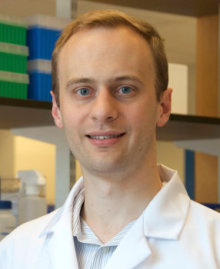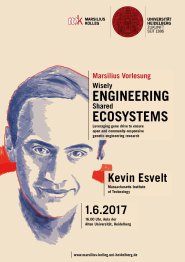Marsilius-Vorlesung
Wisely Engineering Shared Ecosystems. Leveraging gene drive to ensure open and community-responsive genetic engineering research
Kevin Esvelt - Leiter der Sculpting Evolution Group, Assistant Professor MIT Media Lab

Increasingly powerful technologies have enabled us to dramatically reshape ecosystems around the world, but we have never deliberately altered populations of wild organisms. Gene drive promises to change that. Used wisely, it could be a way for local communities to precisely solve ecological problems using biology, not poisons. Yet experiments in this area pose an ethical challenge, for science is typically conducted behind closed doors. Should we develop technologies to alter the shared environment in secret, thereby denying people a voice in decisions that could affect them?
More generally, the wisdom with which we develop and deploy new technologies will define the future of our civilization. Why do we conduct research in small teams of specialists who cannot reliably anticipate consequences on their own? Would it not be better to share our best ideas and plans with others, actively inviting concerns, criticism, and possible improvements? Unfortunately, the current system has evolved to punish such sharing. By highlighting the benefits of an open approach and the dangers of the status quo, CRISPR-based gene drive could change those incentives. The most important ecosystem to be engineered is the scientific enterprise.
Donnerstag, 1 Juni 2017, 16 Uhr
Ort: Aula der Alten Universität Heidelberg
Grabengasse 1, 69117 Heidelberg



